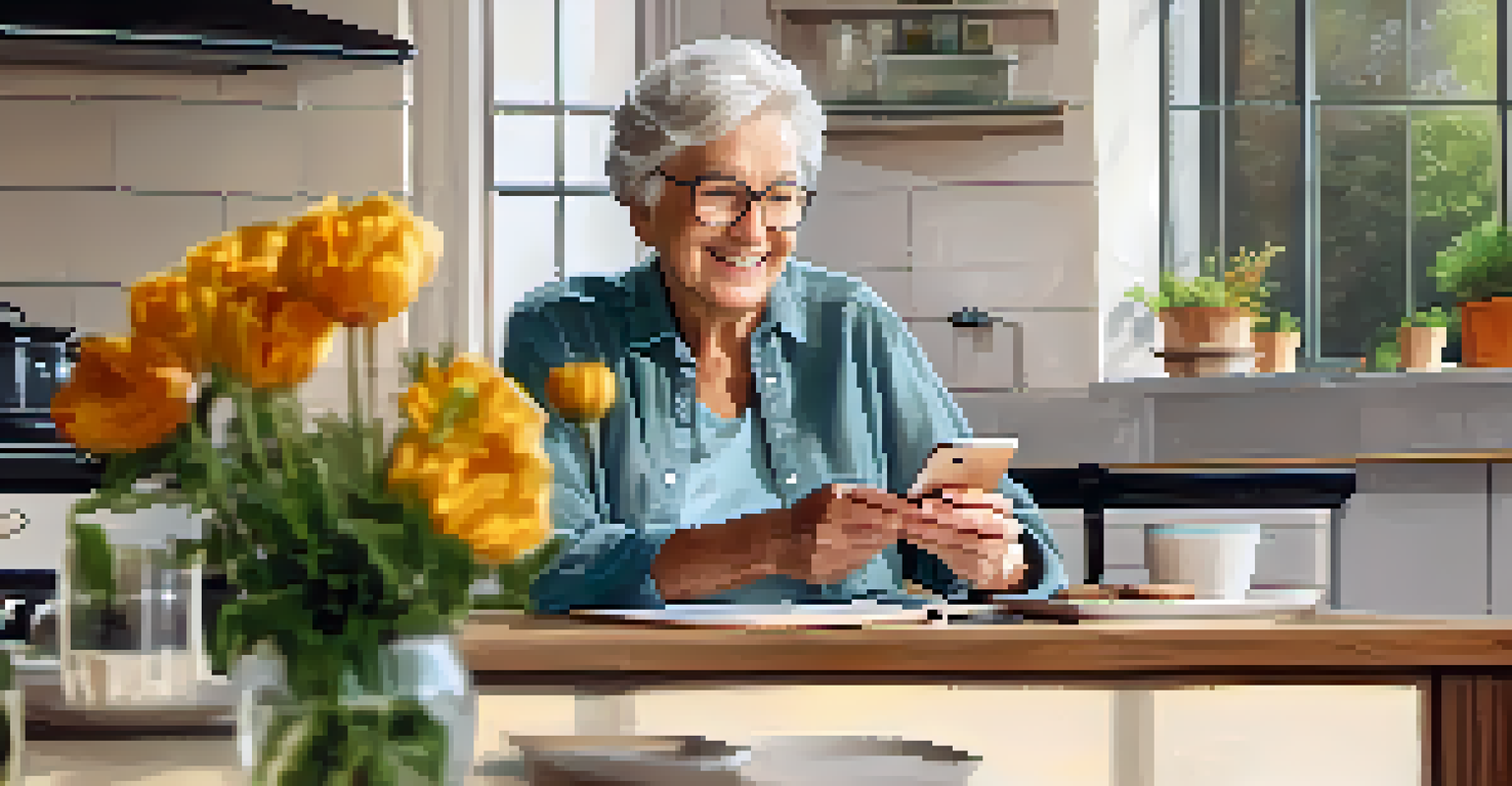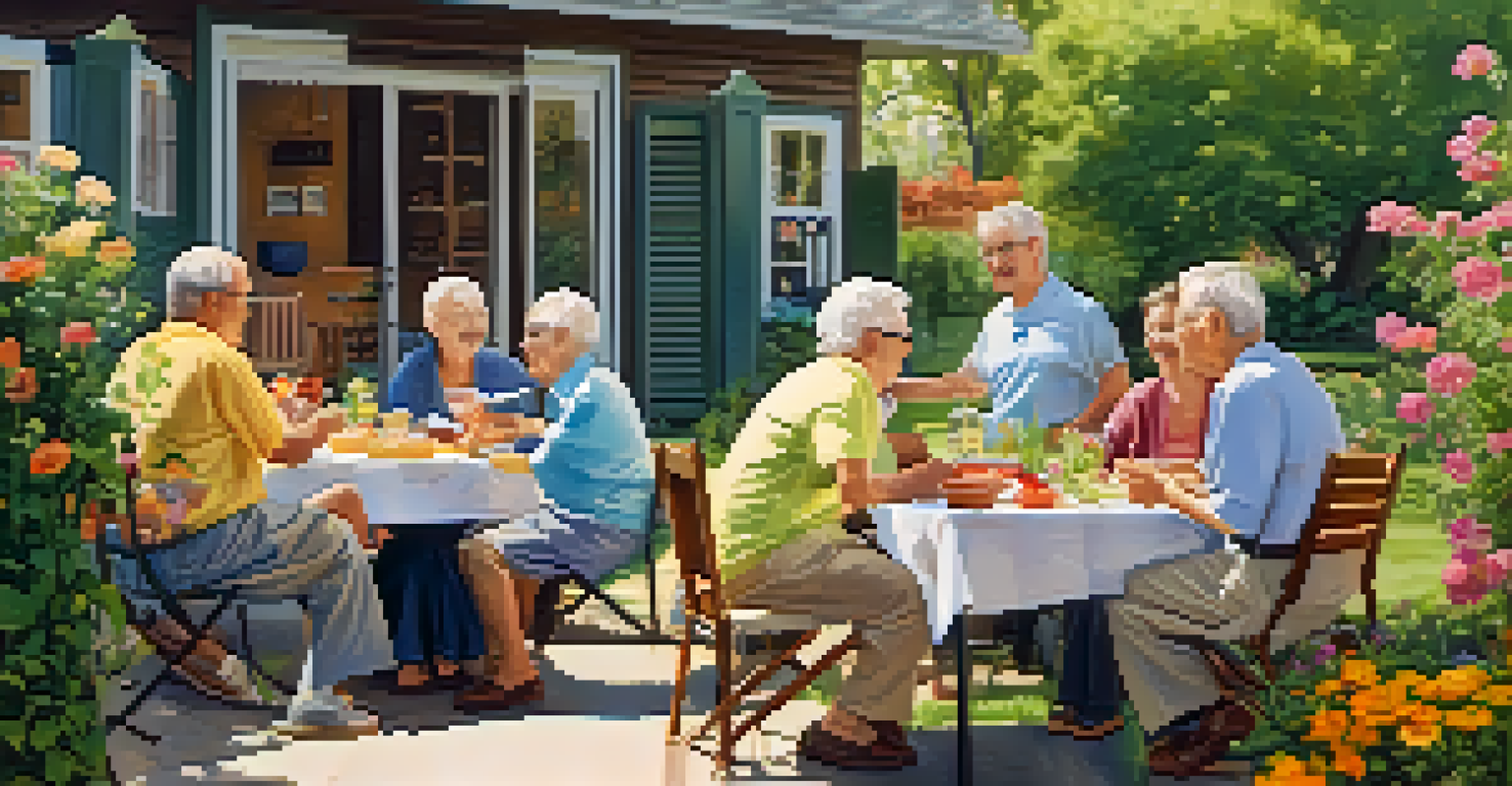Top Personal Safety Tips for Seniors Living Alone

Create a Safe Home Environment to Prevent Accidents
One of the first steps to ensuring personal safety for seniors is to create a secure home environment. This includes removing tripping hazards like loose rugs and clutter from walkways. Additionally, installing grab bars in the bathroom and ensuring good lighting can make a world of difference.
Safety doesn't happen by accident.
Regularly check smoke detectors and carbon monoxide alarms to ensure they are functioning properly. It's also important to keep emergency numbers easily accessible, perhaps on the fridge or saved in a phone. A little preparation can help prevent accidents and provide peace of mind.
Finally, consider utilizing home safety devices such as medical alert systems. These allow seniors to call for help quickly if they experience a fall or medical emergency, further enhancing their safety while living alone.
Stay Connected with Family and Friends Regularly
Maintaining social connections is a vital part of personal safety for seniors living alone. Regular check-ins from family and friends can help ensure that seniors are safe and healthy. Consider scheduling daily or weekly calls to catch up and discuss any concerns.

Engaging in social activities—whether in-person or virtually—can help combat feelings of loneliness while also providing a support system. This could be anything from joining a local club to participating in online classes.
Create a Safe Home Environment
Removing tripping hazards and installing safety devices can significantly enhance seniors' safety at home.
Additionally, using technology like video calls can help seniors stay connected with loved ones, making them feel less isolated. This connection not only enhances their emotional well-being but also adds an extra layer of safety.
Establish a Routine for Daily Activities
Creating a daily routine can significantly enhance safety for seniors living alone. A structured schedule helps them remember to take medications, eat meals, and engage in physical activity, which is essential for overall health.
The best way to predict the future is to create it.
Routines can also reduce the risk of accidents, as they encourage consistency in daily tasks. For instance, if a senior knows they always prepare meals at a certain time, they are less likely to forget and skip eating.
Incorporating regular exercise into their routine can improve strength and balance, further reducing the risk of falls. Simple activities like stretching or walking can make a big difference in maintaining physical health.
Use Technology for Safety and Convenience
Technology can be a powerful ally in promoting safety for seniors. From smart home devices that can control lighting and security systems to health-monitoring apps, there are countless options available. These tools can simplify daily living while enhancing safety.
For example, smart doorbells can alert seniors when someone is at the door, allowing them to see who it is before opening it. Additionally, wearable devices can track health metrics and send alerts if something seems off.
Stay Connected with Loved Ones
Regular social interactions help combat loneliness and provide a vital support system for seniors living alone.
Moreover, learning to use smartphones or tablets can empower seniors to access emergency services or connect with loved ones at the touch of a button. Embracing technology can help seniors feel more secure in their homes.
Know Your Neighbors and Build a Support Network
Establishing a good relationship with neighbors can create a strong support network for seniors living alone. Knowing who lives nearby can provide a sense of community and safety. Encourage friendly interactions, such as greeting each other or sharing occasional meals.
In addition to fostering friendships, seniors can also create a buddy system with neighbors. This means looking out for one another and checking in, especially during emergencies or severe weather.
Community programs and local resources can also be beneficial. Many areas offer senior centers or volunteer services that can provide assistance, making it easier to stay connected and supported.
Develop a Personal Emergency Plan
Having a personal emergency plan is crucial for seniors living alone. This plan should detail what steps to take in case of various situations, such as medical emergencies or natural disasters. It’s important to have a clear understanding of how to respond when unexpected events occur.
Seniors should also identify a trusted person to contact in case they need help. This could be a friend, family member, or neighbor who can step in when necessary. Keeping a list of emergency contacts readily available can make a significant difference.
Establish a Personal Emergency Plan
Having a clear emergency plan and knowing who to contact can empower seniors to respond effectively during crises.
Additionally, practicing the emergency plan can help seniors feel more confident in their ability to respond effectively. Regularly reviewing and updating the plan ensures it remains relevant as circumstances change.
Stay Informed About Local Resources and Services
Knowledge is power, especially when it comes to personal safety. Seniors should familiarize themselves with local resources, such as community centers, healthcare services, and emergency contacts. This information can be invaluable in times of need.
Many communities offer programs specifically designed to assist seniors, providing everything from transportation services to health screenings. Being aware of these options can enhance their quality of life and ensure they’re not isolated.

Moreover, seniors should also keep an eye on local news and weather updates. Understanding the community’s current situations, such as extreme weather or safety alerts, enables them to make informed decisions about their safety.
Trust Your Instincts and Stay Aware of Surroundings
One of the most important safety tips for seniors living alone is to trust their instincts. If something doesn’t feel right, it’s crucial to take action, whether that means leaving a situation or calling for help. This sense of self-awareness can significantly enhance personal safety.
Seniors should also practice staying aware of their surroundings, especially when out in public or when someone unfamiliar is nearby. Simple tactics like staying alert and avoiding distractions can help prevent potential threats.
Encouraging seniors to engage in activities like walking in well-lit areas or traveling with a friend can also enhance their safety. Awareness combined with instinct can create a proactive approach to personal safety.